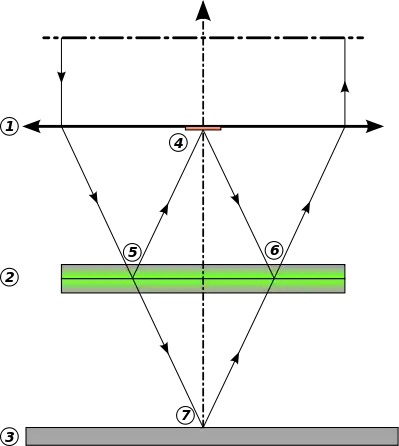Optical path
Optical path (OP) is the trajectory that a light ray follows as it propagates through an optical medium. The geometrical optical-path length or simply geometrical path length (GPD) is the length of a segment in a given OP, i.e., the Euclidean distance integrated along a ray between any two points.[1] The mechanical length of an optical device can be reduced to less than the GPD by using folded optics. The optical path length in a homogeneous medium is the GPD multiplied by the refractive index of the medium.

The figure shows the optical path of a Mirau-objective respectively a Mirau-interferometer. Reference beam (4 to 6) and object beam (7) have identical optical path length and can thus cause white light interference.
Factors affecting optical path
Path of light in medium, or between two media is affected by the following:
Simple materials used
- Lenses
- Prisms
- Mirrors
- Transparent materials (e.g. optical filters)
- Translucent materials (e.g. frosted glass)
- Opaque materials
References
- Bass, M.; DeCusatis, C.; Enoch, J.M.; Lakshminarayanan, V.; Li, G.; MacDonald, C.; Mahajan, V.N.; Van Stryland, E. (2009). Handbook of Optics, Third Edition Volume I: Geometrical and Physical Optics, Polarized Light, Components and Instruments(set). Handbook of Optics. McGraw-Hill Education. ISBN 978-0-07-162925-6. Retrieved 2021-10-11.
This article is issued from Wikipedia. The text is licensed under Creative Commons - Attribution - Sharealike. Additional terms may apply for the media files.